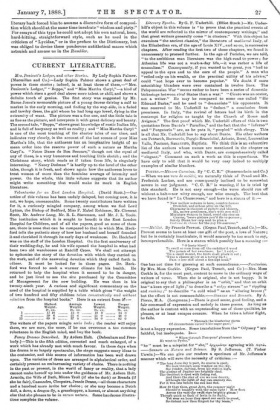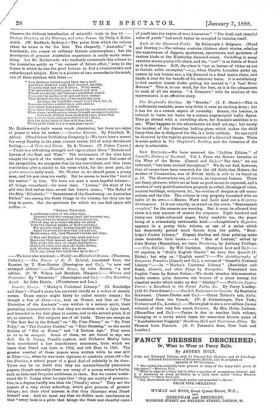POETRY.—Minora Carmine. By " C. C. R." (Sonnenscbein and Co.) —When
we see vers de societd, we naturally think of Praed and Mr. Frederick Locker, and are consequently inclined to be somewhat severe in our judgment. "C. C. R." is wanting, if he is tried by this standard. He is not easy enough—the verse should run off without a halt—nor witty enough, nor wise enough. The best that we have found is "La Chasseresse," and here is a stanza of it :— " Now mellow autumn is here, conntrv-houses
Crowded, and echoes alive on the hill, Charming in choicest of gaiters and blouses, Ha, merry gentlemen, she's with you still!
Miniature weapon in hand, could she step on Canvas, 'twere picture you'd die to possess ; Surely Diana her snip sent to Plan a Costume Is cheese for the gay Chasseresse."
—Melilot. By Francis Prevost. (Regan Paul, Trench, and Co.)—Mr. Prevost seems to have at least one gift of the poet, a love of Nature ; but he is certainly inarticulate, it would scarcely be too much to say, incomprehensible. Here is a stanza which possibly has a meaning
0 hasty blood !
To swell so soon from off the embitter'd wood
The poison of her sweetness. Lo! I said,— 'Tie a small wound, the knife shall pluck it out ; 'Twas a chance ari ow at a roving dust;
Pain is less stiff about a fire-dipt bead."
One has not time for guessing at such conundrums.—Fantasias. By Mrs. Moss Cockle. (Kegan Paul, Trench, and Co )—Mrs. Moss Cockle is, for the most part, content to move in the ordinary ways of writers of verse. When she is original, she is not happy. It is original to say that a philosopher is an "orbit," and that an orbit. has "a keen eye of light ;" to describe a "sedgy stream" as "rippling and rushing ;" to describe "a cold wind" as an "alluring breeze ;" but the effect is not commendable.—Stanzas and Sonnets. By J. Pierce, MA. (Longmans.)—There is good sense, good feeling, and a. fair command of expression and melody in these poems. As long as the author is content with an unpretending use of these qualities, he pleases, or at least escapes censure. When he tries a loftier flight, he fails.
"Through the blustering storm Of circumstanee career'd his eager gaze ;"
is not a happy expression. Some translations from the " Odyssey" are faithful, but inadequate. In-
" When through Panoperue pleasant lawns Ifs went to Pytho."
" he " must be a misprint for "she," Ox.ope4rev agreeing with Arab. —Sonnets on Nature and Science. By S. Jefferson. (T. Fisher Unsvin.)—We can give our readers a specimen of Mr. Jefferson's manner which will save the necessity of criticism :— " The long June day is past, its course is sped ;
We look through open window on the sky.
See yonder, darting, from his station high, The gleams of Jupiter are brightly shed. The Occident is dyed with fading red, And there the star of eve we now descry. Although the light of day can scarcely die. Per it was late before the Ban had fled.
How fit that thou, great Jove, the summer night Should'st beautify with thy calm light ! How fleet Across the void thy swift rays brightly gleam I Though quick as flash of levin in its flight, Yet near an flour they speed our earth to greet, So distant now then fiingest far thy beam,"
Observe the delicate introduction of scientific truth in line 13.— Station Hunting on the Warrego, and other Poems. By Philip J. Holds. worth. (W. Maddock, Sydney.)—The poem from which the volume takes its name is far the best. The rhapsody, "Australia," is bombastic, the verses on ordinary themes commonplace ; but the description of genuine Australian experience is really worth some- thing. Let Mr. Holdsworth, who modestly commends this volume to the Australian public as "an earnest of future effort," keep to the theme in which he has the good fortune to find a characteristic and unhackneyed subject. Here is a picture of two comrades in the scrub, one of them stricken with fever :— "Now darkness circled round them like a spell:
And Oscar drowsed. while Paul yearned, moodily, To pierce that vast void Stillness. Fitful winds, Like melancholy night.gas3ps. waxed, and then Waned noiselessly, and timorous bruit:birds wailed From out the mallee-scrub and salt-lansh clumps
That flanked the dun base of the sand.ridge near.
At times, far dolefuller sounds vexed Paul, for, lo, Sonorous curlews scudded past, with shrieks And dismal lamentations, wofuller Than those dread groans which daunt the woodman's heart When strew: north.easters sweep through swamp-oak groves. Forlornly shrilled these wasteland cries, while Paul Pat, hour by hour, and marvelled if Gad's Hand, Past the fierce limits of that wild lone land,
Would guide them to a hsvened peace again."
Mr. Holdsworth'e style wants much chastening, but there are signs of power in what he writes.—Sunday Sonnets. By Elizabeth M. Alford. (Blackfriars Publishing Company.)—We have here a sonnet for every Sunday in the year, correct verses, full of sober devotional feeling.--1 Time and Times. By A. Werner. (T. Fisher Unwin.) —There is a refreshing strength and vigour about these "Ballads and Lyrics of the East and West." The movements of the time have caught the spirit of the writer, and though we cannot feel some of his sympathies, we recognise that he has convictions, and that these convictions give a reality to his verse which, for the most part, the poetce minores sadly want. Mr. Werner is, we should guess, a young man, and his pen runs too easily. But be seems to have the "root of the matter" in him. We have not seen a more hopeful volume— all things considered—for some time. " Leaina," the story of the girl who died rather than reveal her lover's name ; "The Ballad of the Ship Elizabeth f " " Bannerman of the Dandenong : an Australian Ballad," are among the finest things in the volume, but they are too long to quote. But the specimen for which we can find space will euffice
" GEORGE TINWOR111.
A craftsman-artist of the olden time,
Dowered with the cunning hand and reverent eye, That scorns no meanest thing he passes by, (For all may be as stairs whereby we climb Unto the clearest heights of God's sublime.) Nor proudly draws, feeling himself too high, Apart from brother-men that toil and cry, Heart-weary still, 'mid Pharaoh's bricks and slime.
0 Man and Brother! they that work and love Have ever their reward, and thou bast thine ! Who works like thee, in simple faithfulness, Shall look clear-eyed upon the Light Divine, And, blessing others, win a joy above
Their joy, whom this world rises up to bless."
—We have also received :— Wic/if : an Historical Drama. (Thornton, Oxford.) The Poems of K. F. Relaieff, translated from the Russian by T. Hart-Davies (Remington and Co.), "a new and enlarged edition."—Wayside Songs, by John Brown, "a new edition. (F. W. Wilson and Brothers, Glasgow.)—Whims and Fantasies. By "Emeritus." (Remington and (Jo.)—The Recording Angel. By John Harris. (Wertheimer and Lea.)























































 Previous page
Previous page